

Teaching complete evolutionary stories increases learning. Public release date: 15-Jun-2013 [ Print | E-mail Share ] [ Close Window ] Contact: Tim Beardsleytbeardsley@aibs.org 703-674-2500 x326American Institute of Biological Sciences Many students have difficulty understanding and explaining how evolution operates.
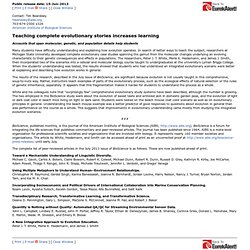
In search of better ways to teach the subject, researchers at Michigan State University developed complete evolutionary case studies spanning the gamut from the molecular changes underlying an evolving characteristic to their genetic consequences and effects in populations. The researchers, Peter J. Great Scientists Don't Need Math. The Art of Observation and How to Master the Crucial Difference Between Observation and Intuition. Science Minus Science. STEM Knowledge Is Only Skin Deep - High School Notes. Kristina Brant makes bio-diesel from algae in Chemical Analysis research class at Thomas Jefferson High School.

American teens are adept at conducting scientific experiments, but only if they don't stray beyond the basics, according to assessment results released Tuesday by the National Center for Education Statistics. Seventy-five percent of high school seniors successfully completed straightforward experiments as part of the 2009 National Assessment of Educational Progress (NAEP) science exam. The Faulty Logic of the 'Math Wars' The Stone is a forum for contemporary philosophers and other thinkers on issues both timely and timeless.
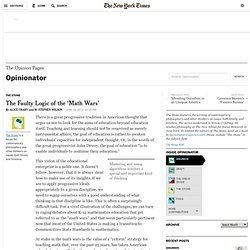
There is a great progressive tradition in American thought that urges us not to look for the aims of education beyond education itself. The STEM Crisis Is a Myth. You must have seen the warning a thousand times: Too few young people study scientific or technical subjects, businesses can’t find enough workers in those fields, and the country’s competitive edge is threatened.
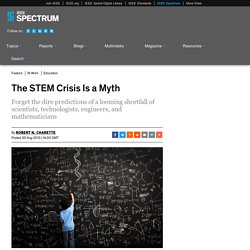
It pretty much doesn’t matter what country you’re talking about—the United States is facing this crisis, as is Japan, the United Kingdom, Australia, China, Brazil, South Africa, Singapore, India…the list goes on. In many of these countries, the predicted shortfall of STEM (short for science, technology, engineering, and mathematics) workers is supposed to number in the hundreds of thousands or even the millions.
A 2012 report by President Obama’s Council of Advisors on Science and Technology, for instance, stated that over the next decade, 1 million additional STEM graduates will be needed. In the U.K., the Royal Academy of Engineering reported last year that the nation will have to graduate 100 000 STEM majors every year until 2020 just to stay even with demand. Frustrated professors convince elementary schools to step back from ‘new math’ and go ‘back to basics’ University of Winnipeg math professor Anna Stokke and two of her colleagues knew there was “a huge problem,” when they started hearing about Manitoba grade school students not being taught how to do vertical addition, carry or borrow numbers, or knowing their times tables.
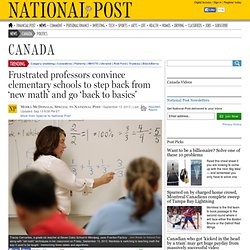
Then, two years ago, she and Robert Craigen, a fellow U of W professor, and Fernando Szechtman a math professor at the University of Regina, formed WISE Math — the Western Initiative for Strengthening Math Education. A New Digital Divide? For years, schools in rural and urban areas — largely with minority populations — lamented the digital divide as an impasse that prevented the nation’s most disadvantaged students from reaping the educational rewards of the wired generation.
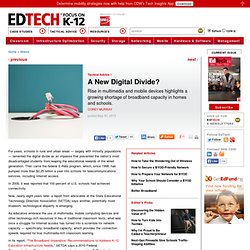
Then came the federal E-Rate program, which, since 1998, has pumped more than $2.25 billion a year into schools for telecommunications services, including Internet access. In 2005, it was reported that 100 percent of U.S. schools had achieved connectivity. Don’t ban social media from schools. By Steve Nicholls, Special to CNN Editor’s note: Steve Nicholls is the author of Social Media in Business.

He is a social media strategist hired by business executives to teach them how to implement a winning social media strategy into their organization. The New York Education Department recently stated that in the first 11 months of 2011 there were 69 cases where teachers were accused of inappropriate conduct with students on Facebook.
Don't let e-safety worries be a barrier to using social media in school. Using social media in school doesn't have to cause e-safety panics.

This practical guide offers great advice for those yet to embrace social networking. Information wants to be free, but does education? - Ideas@Innovations. Posted at 09:46 AM ET, 10/31/2012 Oct 31, 2012 01:46 PM EDT.
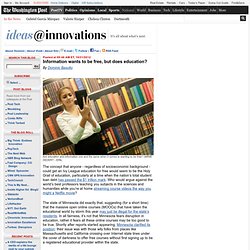
The Unequal State of America: The Decline of the Great Equalizer. To predict student success, there’s no place like home: UF study. GAINESVILLE, Fla. — Current school reform efforts, like No Child Left Behind, emphasize teacher quality as the most important factor in student success, but University of Florida researchers have identified another, stunningly accurate predictor of classroom performance — the student’s home address.
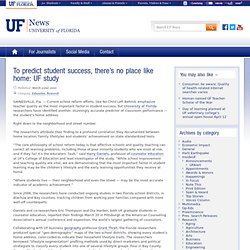
Right down to the neighborhood and street number. The researchers attribute their finding to a profound correlation they documented between home location, family lifestyles and students’ achievement on state standardized tests. “The core philosophy of school reform today is that effective schools and quality teaching can correct all learning problems, including those of poor minority students who are most at risk, and if they fail it’s the educators’ fault,” said Harry Daniels, professor of counselor education at UF’s College of Education and lead investigator of the study. EdTech, Equity and Social Justice. U.S. schools not making the grade when it comes to education technology.
Here’s a bit of disappointing but not-so-surprising news: according to a new report from the nonprofit think tank Center for American Progress (CAP), U.S. schools aren’t doing enough to enable technology in the classroom to live up to its potential. Not only are students across the country frequently using technology for basic skills (for example, middle school students are mostly using computers for drills and practice exercises, not data analysis or other activities that really take advantage of computing power and sophisticated software), schools aren’t looking at the returns on their technology-related investments.
The CAP also found that students from high-poverty areas were less likely to get access to rigorous science and technology learning opportunities. “In this analysis, it quickly became clear to us that many schools and districts have not taken full advantage of the ways that technology can be used to dramatically improve education-delivery systems,” the report said. Coding the Curriculum: How High Schools Are Reprogramming Their Classes. The STEM Gender Gap. Copyright © 2013 NPR. For personal, noncommercial use only. See Terms of Use. For other uses, prior permission required. This is SCIENCE FRIDAY. I'm Flora Lichtman. Well, among college grads, men outnumber women in nearly every science and engineering major, according to a report by the American Association of University Women. Is Algebra Necessary? Yes, algebra is necessary - The Answer Sheet.
This was written by cognitive scientist Daniel Willingham, professor and director of graduate studies in psychology at the University of Virginia and author of “Why Don’t Students Like School?” His newly published book is “When Can You Trust The Experts? How to tell good science from bad in education.” This appeared on his Science and Education blog. When Andrew Hacker asks “Is Algebra Necessary?”, why doesn’t he just ask “Is High School Necessary?”